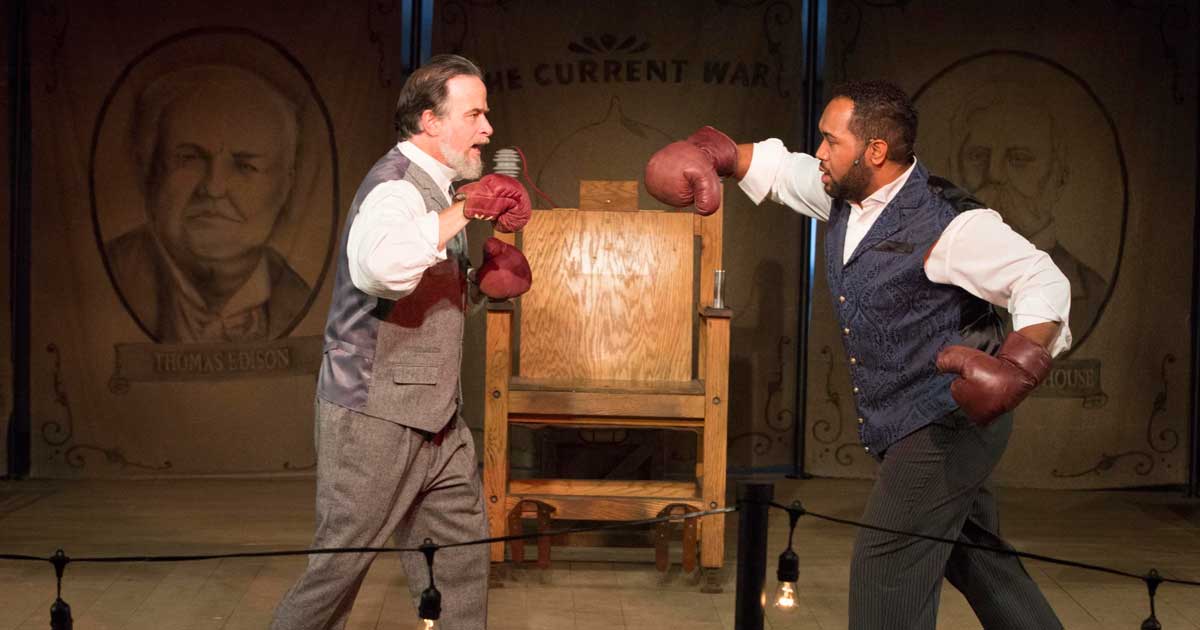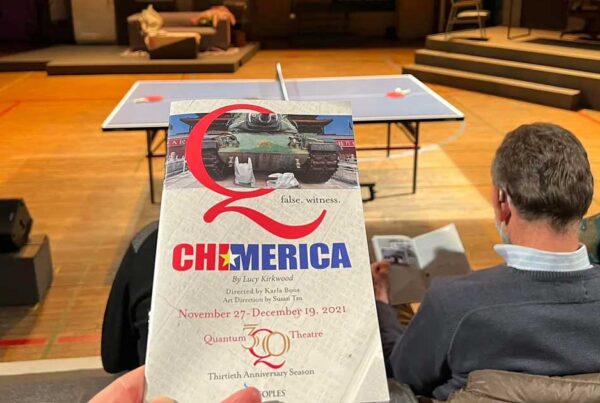
The Pittsburgh Tatler – Here’s a partial list of things I didn’t know about the development of electricity before seeing the the opening night of The Current War at Westinghouse Park:
- that Thomas Edison tested a gazillion different materials before finding one that would work as a filament in the light bulb he invented;
- that it was George Westinghouse – and not Nikola Tesla – who was Edison’s primary rival in the battle over AC vs. DC current;
- that Edison was a prideful, bitter bastard with a tendency to take credit for his employees’ work and to cut off his nose to spite his face;
- that, in contrast, Westinghouse was a positively enlightened capitalist, whose generosity toward his employees was matched by his rapacious acquisition of his rivals’ patents; and
- that both of those dudes could sing.
Okay, that last item is obviously not historical fact, but rather a byproduct of their representation by actors Daniel Krell (Edison) and Billy Mason (Westinghouse) in Pittsburgh native Michael Mitnick’s musical about their rivalry. And to my mind, it’s never a bad thing to have reminders, when confronted with “historical facts,” that there is always license taken in their presentation.
The license taken here – by both Mitnick and the Quantum creative team led by director Tome’ Cousin – is cheeky and provocative, particularly for a viewer like myself, whose previous understanding of the history of the development of electricity was primarily shaped by regular elementary school field trips to the adulatory shrine that Edison’s friend Henry Ford established in his honor at Greenfield Village outside Detroit. There, Edison comes off much as he does in the song Mitnick gives to his assistant Francis Upton (Quinn Patrick Shannon) – as a “God among men” and not, as this musical would have it, as the grudge-bearing cynic who would electrocute any number of mammals in his quest to convince people of the dangers of alternating current.
All this is to say that for this viewer, The Current War is as much about the representation of history – that is, about how history is framed, whose side it takes, and where it locates its central conflicts – as it is about history itself.
In Mitnick’s telling of the story, Edison is an anti-hero protagonist, and the musical manages the neat trick of getting you to sympathize with Edison’s anger and frustration at Westinghouse while also feeling abhorred by his tactics. With a bit of historiographic sleight of hand, Mitnick gives the anti-death-penalty Edison way more credit for the invention of the electric chair than is properly his due, which (for this dog-lover, at least) is probably appropriate pay-back for the many pooches (and other mammals) Edison and his team sacrificed on the altar of his egocentric crusade to discredit Westinghouse and his AC system.
Indeed, this production does not want you to forget that the primary victims of this “current war” walked on four legs: Tony Ferrieri’s scenic design prominently features a wall of burlap panel curtains that depict, in addition to portraits of the two inventors and images of their inventions, a dog, a horse, a gorilla, and an elephant. But fear not, Dear Reader: no real animals are harmed in this production. All of the non-humans that get zapped to death are represented by puppets (cleverly designed by Nick Lehane). Moreover, in an astute casting move, Cousin uses characters played by Jerreme Rodriguez to link together Edison’s animal and human victims of electrocution. Rodriguez plays, in turn, a young boy whose dog is sacrificed in the first scene; the gorilla who is “Westinghoused” in a demonstration of the dangers of alternating current; and William Kemmler, the first man to be executed in an electric chair. This embodied dot-connecting not only adds a touch of irony to the proceedings, but also effectively calls attention to the callousness of Edison’s ambition.
Mitnick’s account is far kinder to Westinghouse than it is to Edison: Westinghouse is generous where Edison is petty; forgiving where Edison is begrudging; humble and modest where Edison is egotistical and prideful. Was Westinghouse in fact such a saint among the robber-barons? It’s not clear that any of us can ever know. At one point Westinghouse mentions to his wife Marguerite (Melessie Clark) that he wants to have all of his papers and letters destroyed. The historical Westinghouse’s archive, including photographs, were in fact burned at his request after his death – which, of course, means that the license to represent his history is broad indeed.
Also cheeky is Mitnick’s treatment of history in musical terms. For example, he gives us a jaunty, cheerful song about the first time Edison “Westinghoused” a horse, as well as a show-stopping vaudevillian song-and-dance number that tells the sorry tale of how William Kemmler murdered his wife with a hatchet in a drunken rage. The ensemble captures the mood and spirit of such numbers with zippy panache, superbly accompanied by musical director Douglas Levine on keyboard and Simon Cummings on cello. One humorous duet unexpectedly skewers sanctimonious Christians whose charity will not extend to the convicted criminal Kemmler. These musical style choices are, of course, fun and catchy and entertaining; but they’re also kind of subversive, calling attention to Mitnick’s deliberate shaping of how the history will be perceived.
In other words, you may think that The Current War aims to elucidate the history of two rival inventors of the Industrial Age. But at nearly every level, this is a musical that will probably have you questioning how we know what we know about the past, and thinking about who has had the power and the privilege to tell those stories.




